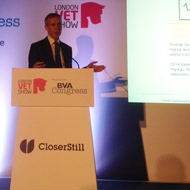Tackling antibiotic resistance

Nigel Gibbens outlined a series of significant statistics.
Since the introduction of global costs into the debate on antimicrobial resistance (AMR), there now appears to be more concerted action from governments worldwide. This was one of several significant points made at a session on the subject at the BVA Congress at the Excel Arena in London.
In an authoritative and succinct presentation, Nigel Gibbens, the UK's chief veterinary officer, outlined a series of significant statistics. He told delegates that by the year 2050 it is expected that there will be 10 million human deaths as a consequence of AMR, which will represent a reduction in global GDP of at least 100 trillion US dollars.
He said that at present, 70 per cent of antibiotics are consumed by animals and 30 per cent by humans. He also explained how antibiotics had now been categorised such that 31 are deemed to be critically important (CIA) and 10 not medically important – and that there is increasing pressure on the veterinary profession to reduce its usage of the former.
The speaker pointed out that an AMR global action plan had been established at UN Assembly level and that it had made the following broad recommendations:
- to reduce antibiotic use in livestock
- to encourage greater stewardship of antibiotic usage
- to increase the level of surveillance.
Dr Gibbens indicated that all was not "doom and gloom" and he made reference to the VMD's latest VARSS Report. This indicated that, between 2012 and 2015, there had been a 10 per cent reduction in total sales of antibiotics used in food-producing animals – with fluoroquinolones down by three per cent and cephalosporins down by 11 per cent. There have been dramatic reductions in the poultry and pig sectors.
The speaker told delegates that the future lies in each veterinary sector taking a critical look at the antibiotics that are being used, why they are being used, and what opportunities there are for further reduction in usage, especially by looking at alternative approaches and attitudes to the promotion of animal health.
In conclusion, Dr Gibbens cautioned vets about being complacent about the application of antibiotics in the treatment of companion animals, especially the CIAs which represent about 80 per cent of those prescribed in cats. He stressed that this was a very important consideration because it is known that E.coli pass between household pets and their human owners.



 The Veterinary Medicines Directorate (VMD) is inviting applications from veterinary students to attend a one-week extramural studies (EMS) placement in July 2026.
The Veterinary Medicines Directorate (VMD) is inviting applications from veterinary students to attend a one-week extramural studies (EMS) placement in July 2026.